The global fill finish manufacturing market is projected to grow from USD 14.7 billion in 2025 to approximately USD 35.8 billion by 2035, recording an absolute increase of USD 21.1 billion over the forecast period. This translates into a total growth of 143.5%, with the market forecast to expand at a compound annual growth rate (CAGR) of 9.3% between 2025 and 2035. The overall market size is expected to grow by nearly 2.44X during the same period, supported by increasing demand for biologics and biosimilars, rising adoption of prefilled syringes and advanced drug delivery systems, and growing emphasis on pharmaceutical manufacturing efficiency and sterile production capabilities.
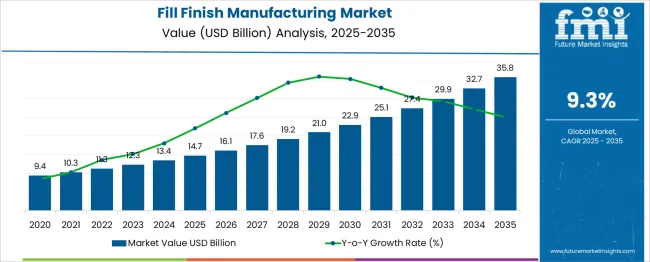
Between 2025 and 2030, the fill finish manufacturing market is projected to expand from USD 14.7 billion to USD 23.1 billion, resulting in a value increase of USD 8.4 billion, which represents 39.8% of the total forecast growth for the decade. This phase of development will be shaped by rising demand for injectable drug products, increasing adoption of automated filling systems, and growing penetration of advanced packaging solutions in pharmaceutical manufacturing. Equipment manufacturers and consumable suppliers are expanding their fill-finish product portfolios to address the growing demand for sterile manufacturing solutions and high-quality drug packaging systems.
| Metric | Value |
|---|---|
| Estimated Value in (2025E) | USD 14.7 billion |
| Forecast Value in (2035F) | USD 35.8 billion |
| Forecast CAGR (2025 to 2035) | 9% |
From 2030 to 2035, the market is forecast to grow from USD 23.1 billion to USD 35.8 billion, adding another USD 12.7 billion, which constitutes 60.2% of the overall ten-year expansion. This period is expected to be characterized by the expansion of biologics manufacturing capabilities, the integration of Industry 4.0 technologies in fill-finish operations, and the development of next-generation drug delivery systems, including smart syringes and connected devices. The growing adoption of personalized medicines and specialty pharmaceuticals will drive demand for flexible fill-finish solutions with enhanced precision and customization capabilities.
Between 2020 and 2025, the fill finish manufacturing market experienced significant acceleration, driven by increased pharmaceutical production demands and growing emphasis on sterile manufacturing capabilities following global health priorities. The market developed as pharmaceutical companies recognized the critical importance of efficient fill-finish operations for drug supply chain reliability and product quality assurance. Regulatory requirements and quality standards began emphasizing the necessity of advanced fill finish technologies in maintaining pharmaceutical manufacturing excellence and patient safety.
Market expansion is being supported by the increasing demand for injectable drug products and the corresponding need for advanced fill-finish manufacturing capabilities that can ensure sterile production and high-quality packaging. Modern pharmaceutical companies are increasingly focused on biologics, biosimilars, and specialty drugs that require sophisticated fill finish processes to maintain product integrity and patient safety. Fill finish manufacturing's proven ability to deliver sterile, precise, and efficient drug packaging makes it an essential infrastructure for pharmaceutical production and supply chain operations.
The growing emphasis on automated manufacturing and Industry 4.0 integration is driving demand for fill finish solutions that can provide enhanced process control, real-time monitoring, and data analytics capabilities. Pharmaceutical manufacturers' preference for systems that combine production efficiency with regulatory compliance is creating opportunities for innovative fill-finish technology implementations. The rising influence of personalized medicine and small-batch production requirements is also contributing to increased adoption of flexible fill finish manufacturing systems that can accommodate diverse product specifications and production volumes.
The market is segmented by product, type, application, end use, and region. By product, the market is divided into instruments and consumables. Instruments include automated machines and semi-automated and manual machines, while consumables encompass prefilled syringes (glass PFS, plastic PFS), vials (glass vials, plastic vials), cartridges, and other consumables. Based on type, the market is categorized into integrated systems and standalone systems. In terms of application, the market is segmented into parenteral drug delivery, biologics manufacturing, personalized medicines, and other applications. By end use, the market is classified into pharmaceutical and biopharmaceutical companies, contract manufacturing organizations, and other end uses. Regionally, the market is divided into North America, Europe, East Asia, South Asia & Pacific, Latin America, and the Middle East & Africa.
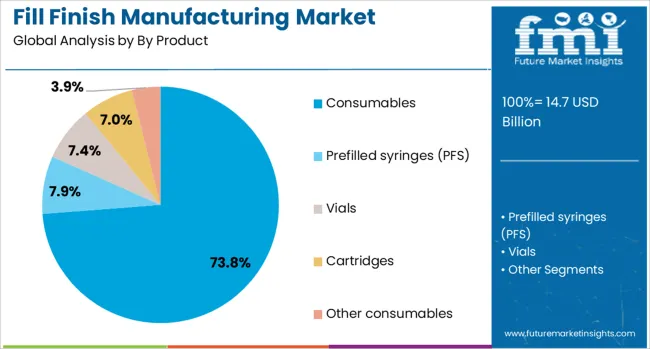
The consumables segment is projected to account for 73.8% of the fill-finish manufacturing market in 2025, reaffirming its position as the dominant product category. Pharmaceutical manufacturers increasingly rely on consumables, including prefilled syringes, vials, and cartridges, for their ongoing production operations and drug packaging requirements. Consumables' critical role in ensuring sterile drug delivery and maintaining product integrity directly addresses pharmaceutical industry demands for reliable and high-quality packaging solutions that meet regulatory standards and patient safety requirements.
This product category forms the foundation of pharmaceutical fill finish operations, as it represents the essential materials required for drug packaging and delivery across multiple therapeutic areas and product types. Manufacturer investments in advanced consumable technologies and ongoing development of specialized packaging solutions continue to strengthen market adoption. With pharmaceutical companies prioritizing production efficiency and product quality, consumables align with both operational requirements and regulatory compliance needs, making them the central component of fill-finish manufacturing strategies.
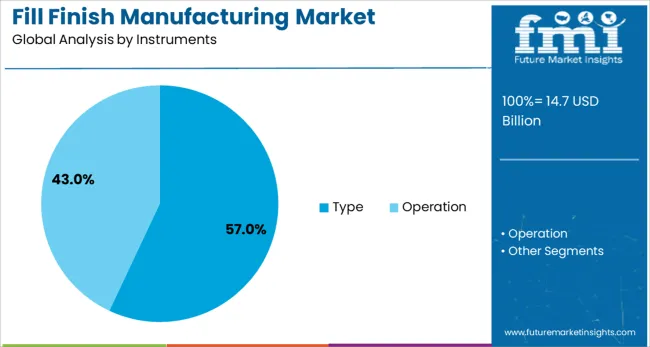
Integrated systems are projected to represent 57% of fill finish manufacturing demand in 2025, underscoring their critical role in modern pharmaceutical production facilities. Pharmaceutical manufacturers prefer integrated systems for their ability to provide comprehensive fill finish solutions that combine multiple process steps in streamlined, automated workflows. Positioned as essential infrastructure for large-scale pharmaceutical production, integrated systems offer both operational efficiency benefits and enhanced process control capabilities.
The segment is supported by increasing demand for automated manufacturing solutions and growing emphasis on production efficiency and quality consistency in pharmaceutical operations. Additionally, manufacturers are investing in integrated systems that can support multiple product formats and provide flexible manufacturing capabilities for diverse drug products. As pharmaceutical companies prioritize operational excellence and regulatory compliance, integrated fill finish systems will continue to dominate the market while supporting scalable and reliable drug manufacturing operations.
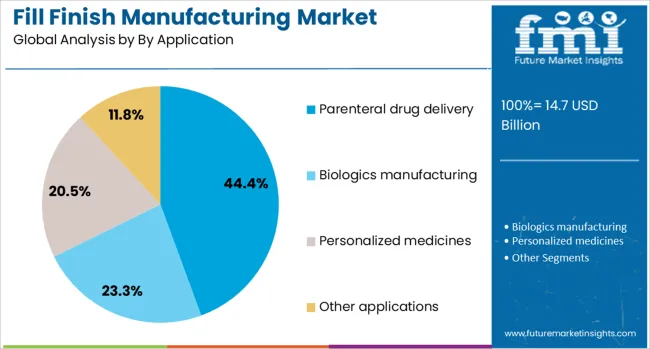
The parenteral drug delivery application is forecasted to contribute 44.4% of the fill-finish manufacturing market in 2025, reflecting the critical importance of injectable drug products in modern pharmaceutical therapy. Healthcare providers and patients increasingly demand parenteral drug delivery systems that provide precise dosing, enhanced bioavailability, and convenient administration characteristics. This aligns with pharmaceutical industry trends that emphasize injectable drug development for complex therapeutic areas, including oncology, immunology, and specialty care applications.
The segment benefits from continuous innovation in drug delivery technology and growing therapeutic applications requiring parenteral administration routes. With increasing regulatory requirements for sterile manufacturing and rising patient expectations for drug delivery convenience, parenteral drug delivery serves as a primary driver of fill finish manufacturing demand, making it a critical component of pharmaceutical industry growth and therapeutic advancement.
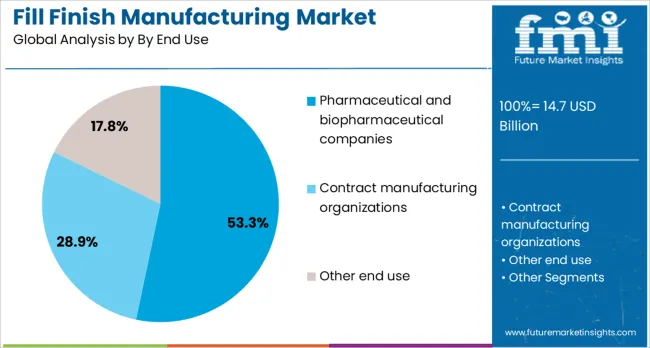
The pharmaceutical and biopharmaceutical companies end-use segment is forecasted to contribute 53.3% of the fill-finish manufacturing market in 2025, reflecting the primary role of pharmaceutical manufacturers in driving market demand. Pharmaceutical companies increasingly invest in fill-finish capabilities to support their drug development and manufacturing operations while maintaining direct control over product quality and supply chain reliability. This aligns with industry trends that emphasize vertical integration and manufacturing excellence in pharmaceutical production.
The segment benefits from continuous pharmaceutical innovation and growing investment in biologics and specialty drug manufacturing capabilities. With established regulatory expertise and quality standards, pharmaceutical and biopharmaceutical companies serve as the primary market for fill-finish manufacturing solutions, making them a critical foundation for market growth and technology advancement in drug manufacturing and packaging operations.
The fill-finish manufacturing market is advancing rapidly due to increasing demand for injectable drugs and growing emphasis on sterile manufacturing capabilities in pharmaceutical production. However, the market faces challenges, including high capital investment requirements, complex regulatory compliance standards, and skilled workforce shortages for advanced manufacturing operations. Innovation in automation technologies and process optimization continues to influence product development and market expansion patterns.
The growing adoption of biologics and biosimilar drugs is enabling pharmaceutical companies to invest in specialized fill finish capabilities that can handle complex drug formulations and maintain product stability. Biologics manufacturing requires advanced fill finish technologies that can provide precise handling and sterile processing for temperature-sensitive and complex drug products. Pharmaceutical companies are increasingly recognizing the importance of specialized fill-finish capabilities for successful biologics commercialization.
Modern fill finish equipment manufacturers are incorporating advanced automation, artificial intelligence, and data analytics capabilities to improve manufacturing efficiency and quality control. These technologies enhance process monitoring while providing real-time quality assurance and predictive maintenance capabilities. Advanced manufacturing systems also enable pharmaceutical companies to achieve higher productivity and regulatory compliance while reducing operational costs and manufacturing risks.
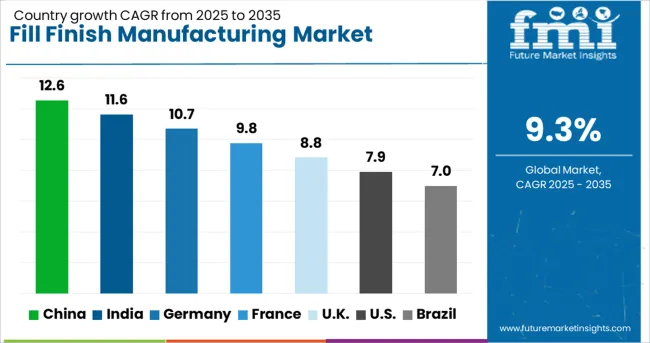
| Country | CAGR (2025 to 2035) |
|---|---|
| China | 12.6% |
| India | 11.6% |
| Germany | 10.7% |
| France | 9.8% |
| UK | 8.8% |
| USA | 7.9% |
| Brazil | 7% |
The fill finish manufacturing market is experiencing exceptional growth globally, with China leading at a 12.6% CAGR through 2035, driven by massive pharmaceutical manufacturing expansion, increasing biologics production, and growing investment in advanced manufacturing technologies. India follows closely at 11.6%, supported by an expanding pharmaceutical industry, rising contract manufacturing capabilities, and increasing focus on export-oriented pharmaceutical production. Germany shows strong growth at 10.7%, emphasizing precision engineering and advanced pharmaceutical manufacturing. France records 9.8%, focusing on pharmaceutical innovation and biotechnology advancement. The UK shows 8.8% growth, prioritizing biopharmaceutical manufacturing and regulatory excellence. The report covers an in-depth analysis of 40+ countries; seven top-performing countries are highlighted below.
Revenue from fill finish manufacturing in China is projected to exhibit exceptional growth with a CAGR of 12.6% through 2035, driven by massive pharmaceutical manufacturing capacity expansion and increasing focus on advanced drug production technologies. The country's position as a global pharmaceutical manufacturing hub and growing domestic pharmaceutical market are creating significant demand for sophisticated fill-finish solutions. Major international equipment manufacturers and domestic technology companies are establishing comprehensive manufacturing and service capabilities to serve the expanding pharmaceutical sector.
Revenue from fill finish manufacturing in India is expanding at a CAGR of 11.6%, supported by the rapidly growing pharmaceutical industry, expanding contract manufacturing capabilities, and increasing focus on export-oriented pharmaceutical production. The country's developing biotechnology sector and rising pharmaceutical innovation are driving demand for advanced fill-finish manufacturing solutions. International equipment suppliers and domestic manufacturers are establishing comprehensive service networks to address the growing demand for pharmaceutical manufacturing technologies.
Demand for fill finish manufacturing in Germany is projected to grow at a CAGR of 10.7%, supported by the country's leadership in precision engineering and strong emphasis on pharmaceutical manufacturing quality and innovation. German pharmaceutical companies and equipment manufacturers consistently demand high-performance fill finish systems that meet stringent quality requirements and provide superior reliability for critical drug production applications.
Revenue from fill finish manufacturing in France is projected to grow at a CAGR of 9.8% through 2035, driven by the country's pharmaceutical industry strength and focus on biotechnology innovation and advanced drug manufacturing. French pharmaceutical companies consistently demand high-quality fill finish solutions that deliver superior performance while supporting innovative drug development and manufacturing operations.
Revenue from fill finish manufacturing in the UK is projected to grow at a CAGR of 8.8% through 2035, supported by strong emphasis on biopharmaceutical manufacturing and pharmaceutical innovation excellence. British pharmaceutical companies and contract manufacturers value advanced technology, regulatory compliance, and proven performance, positioning sophisticated fill finish systems as essential components of competitive pharmaceutical manufacturing operations.
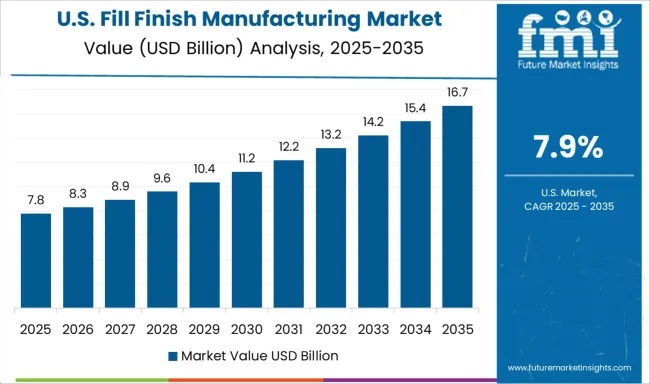
Revenue from fill finish manufacturing in the USA is projected to grow at a CAGR of 7.9% through 2035, supported by the country's leadership in pharmaceutical innovation, advanced biotechnology development, and preference for cutting-edge manufacturing technologies. American pharmaceutical companies prioritize manufacturing efficiency, regulatory compliance, and technological advancement, making advanced fill finish systems a preferred choice in pharmaceutical and biopharmaceutical production applications.
Revenue from fill finish manufacturing in Brazil is projected to grow at a CAGR of 7% through 2035, supported by the expanding pharmaceutical industry, the growing biotechnology sector, and increasing investment in modern manufacturing capabilities. The country's developing pharmaceutical infrastructure and rising focus on domestic drug production are creating significant opportunities for fill finish manufacturing adoption. International equipment manufacturers and technology providers are establishing comprehensive service capabilities to serve the growing pharmaceutical manufacturing requirements.
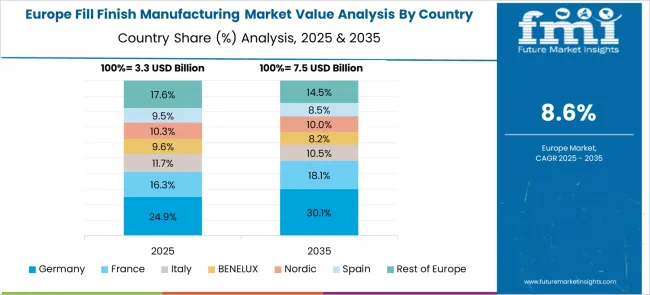
The fill finish manufacturing market in Europe demonstrates mature development across major economies, with Germany showing a strong presence through its advanced pharmaceutical manufacturing sector and expertise in precision engineering, supported by companies leveraging manufacturing excellence to develop high-performance fill finish solutions that emphasize quality, reliability, and regulatory compliance across pharmaceutical and biotechnology applications.
France represents a significant market driven by its pharmaceutical industry heritage and sophisticated understanding of drug manufacturing requirements, with companies focusing on premium fill finish solutions that combine French pharmaceutical expertise with advanced manufacturing technologies for enhanced drug production and packaging capabilities in sterile manufacturing environments.
The UK exhibits considerable growth through its emphasis on pharmaceutical innovation and biopharmaceutical manufacturing excellence, with strong adoption of advanced fill finish systems in pharmaceutical companies, contract manufacturers, and biotechnology firms. Germany and France show expanding interest in automated fill finish applications, particularly in biologics manufacturing and specialty pharmaceutical production. BENELUX countries contribute through their focus on pharmaceutical innovation and advanced manufacturing technologies. At the same time, Eastern Europe and the Nordic regions display growing potential driven by increasing pharmaceutical investment and expanding adoption of modern fill-finish manufacturing capabilities.
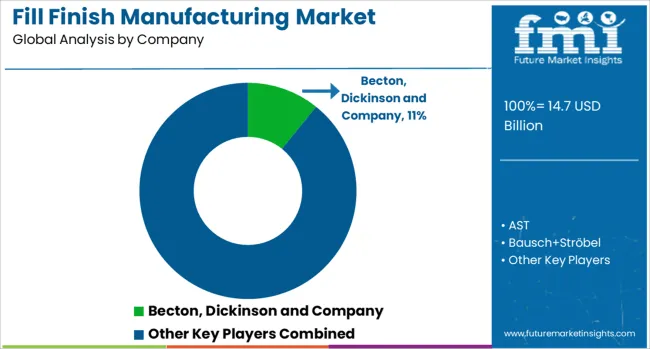
The fill finish manufacturing market is characterized by competition among established pharmaceutical equipment manufacturers, specialized packaging technology companies, and emerging automation solution providers. Companies are investing in advanced manufacturing technologies, product innovation, regulatory compliance capabilities, and comprehensive service networks to deliver reliable, efficient, and compliant fill finish solutions for pharmaceutical and biotechnology applications. Technology leadership, quality assurance, and customer support are central to strengthening market position and customer relationships.
Becton, Dickinson and Company leads the market with significant global market share, offering comprehensive fill finish solutions with a focus on medical device integration and pharmaceutical packaging excellence. AST provides advanced automation systems with emphasis on sterile manufacturing and process control. Bausch+Ströbel delivers specialized fill finish equipment with a focus on pharmaceutical manufacturing applications. Borosil Scientific focuses on glass packaging solutions with emphasis on pharmaceutical-grade materials.
Corning Incorporated provides advanced glass and packaging technologies with emphasis on pharmaceutical applications. Gerresheimer offers comprehensive pharmaceutical packaging solutions, including glass and plastic containers. Groninger specializes in filling and packaging equipment for pharmaceutical applications. I.M.A. Industria Macchine Automatiche delivers comprehensive packaging machinery solutions. Nipro, SCHOTT Pharma, SGD Pharma, Steriline, and Stevanato Group provide specialized fill finish products and services for pharmaceutical manufacturing and packaging applications.
| Items | Values |
|---|---|
| Quantitative Units (2025) | USD 14.7 billion |
| Product | Instruments (Automated machines, Semi-automated and manual machines), Consumables (Prefilled syringes - Glass PFS, Plastic PFS, Vials - Glass vials, Plastic vials, Cartridges, Other consumables) |
| Type | Integrated systems, Standalone systems |
| Application | Parenteral drug delivery, Biologics manufacturing, Personalized medicines, Other applications |
| End Use | Pharmaceutical and biopharmaceutical companies, Contract manufacturing organizations, Other end-use |
| Regions Covered | North America, Europe, East Asia, South Asia & Pacific, Latin America, Middle East & Africa |
| Countries Covered | United States, Canada, United Kingdom, Germany, France, China, Japan, South Korea, India, Brazil, Australia and 40+ countries |
| Key Companies Profiled | Becton Dickinson and Company, AST, Bausch+Ströbel, Borosil Scientific, Corning Incorporated, Gerresheimer, Groninger, I.M.A. Industria Macchine Automatiche, Nipro, SCHOTT Pharma, SGD Pharma, Steriline, and Stevanato Group |
| Additional Attributes | Dollar sales by product type and application category, regional demand trends, competitive landscape, buyer preferences for integrated versus standalone systems, integration with pharmaceutical manufacturing trends, innovations in automation technology, sterile processing advancement, and smart manufacturing solution development |
The global fill finish manufacturing market is estimated to be valued at USD 14.7 billion in 2025.
The market size for the fill finish manufacturing market is projected to reach USD 35.8 billion by 2035.
The fill finish manufacturing market is expected to grow at a 9.3% CAGR between 2025 and 2035.
The key product types in fill finish manufacturing market are consumables, prefilled syringes (pfs), glass pfs, plastic pfs, vials, glass vials, plastic vials, cartridges and other consumables.
In terms of instruments, type segment to command 57.0% share in the fill finish manufacturing market in 2025.






Our Research Products

The "Full Research Suite" delivers actionable market intel, deep dives on markets or technologies, so clients act faster, cut risk, and unlock growth.

The Leaderboard benchmarks and ranks top vendors, classifying them as Established Leaders, Leading Challengers, or Disruptors & Challengers.

Locates where complements amplify value and substitutes erode it, forecasting net impact by horizon

We deliver granular, decision-grade intel: market sizing, 5-year forecasts, pricing, adoption, usage, revenue, and operational KPIs—plus competitor tracking, regulation, and value chains—across 60 countries broadly.

Spot the shifts before they hit your P&L. We track inflection points, adoption curves, pricing moves, and ecosystem plays to show where demand is heading, why it is changing, and what to do next across high-growth markets and disruptive tech

Real-time reads of user behavior. We track shifting priorities, perceptions of today’s and next-gen services, and provider experience, then pace how fast tech moves from trial to adoption, blending buyer, consumer, and channel inputs with social signals (#WhySwitch, #UX).

Partner with our analyst team to build a custom report designed around your business priorities. From analysing market trends to assessing competitors or crafting bespoke datasets, we tailor insights to your needs.
Supplier Intelligence
Discovery & Profiling
Capacity & Footprint
Performance & Risk
Compliance & Governance
Commercial Readiness
Who Supplies Whom
Scorecards & Shortlists
Playbooks & Docs
Category Intelligence
Definition & Scope
Demand & Use Cases
Cost Drivers
Market Structure
Supply Chain Map
Trade & Policy
Operating Norms
Deliverables
Buyer Intelligence
Account Basics
Spend & Scope
Procurement Model
Vendor Requirements
Terms & Policies
Entry Strategy
Pain Points & Triggers
Outputs
Pricing Analysis
Benchmarks
Trends
Should-Cost
Indexation
Landed Cost
Commercial Terms
Deliverables
Brand Analysis
Positioning & Value Prop
Share & Presence
Customer Evidence
Go-to-Market
Digital & Reputation
Compliance & Trust
KPIs & Gaps
Outputs
Full Research Suite comprises of:
Market outlook & trends analysis
Interviews & case studies
Strategic recommendations
Vendor profiles & capabilities analysis
5-year forecasts
8 regions and 60+ country-level data splits
Market segment data splits
12 months of continuous data updates
DELIVERED AS:
PDF EXCEL ONLINE
Filling and Dispensing System for Nuclear Medicine Market Size and Share Forecast Outlook 2025 to 2035
Fillet Weld Grinder Market Size and Share Forecast Outlook 2025 to 2035
Filler and Extender Cosmetics Market Analysis - Size and Share Forecast Outlook 2025 to 2035
Filling and Sealing Machine Market Size and Share Forecast Outlook 2025 to 2035
Fillers & Extenders Market Size and Share Forecast Outlook 2025 to 2035
Filling Fats Market Size, Growth, and Forecast for 2025 to 2035
Industry Share Analysis for Fillings and Toppings Companies
Refillable Pouches Market Analysis - Size, Share, and Forecast Outlook 2025 to 2035
Refillable Deodorants Market Growth, Trends and Forecast from 2025 to 2035
Prefillable Inhalers Market Size and Share Forecast Outlook 2025 to 2035
Global Prefilled Formalin Vials Market Trends – Size, Share & Growth 2025 to 2035
Prefilled Syringe Drug Molecule Market Analysis - Size, Share, and Forecast 2025 to 2035
Cup Filling Machines Market Forecast and Outlook 2025 to 2035
Hot Fill Packaging Market Size and Share Forecast Outlook 2025 to 2035
Lip Filler Market Analysis Size and Share Forecast Outlook 2025 to 2035
Oil Filled Power Transformer Market Size and Share Forecast Outlook 2025 to 2035
Hot Fill Food Packaging Market Size and Share Forecast Outlook 2025 to 2035
Oil Filled Distribution Transformer Market Size and Share Forecast Outlook 2025 to 2035
Fat Filled Milk Powder Market Analysis - Size, Share, and Forecast Outlook 2025 to 2035
Cup Fill and Seal Machine Market by Automation Level from 2025 to 2035

Thank you!
You will receive an email from our Business Development Manager. Please be sure to check your SPAM/JUNK folder too.
Chat With
MaRIA